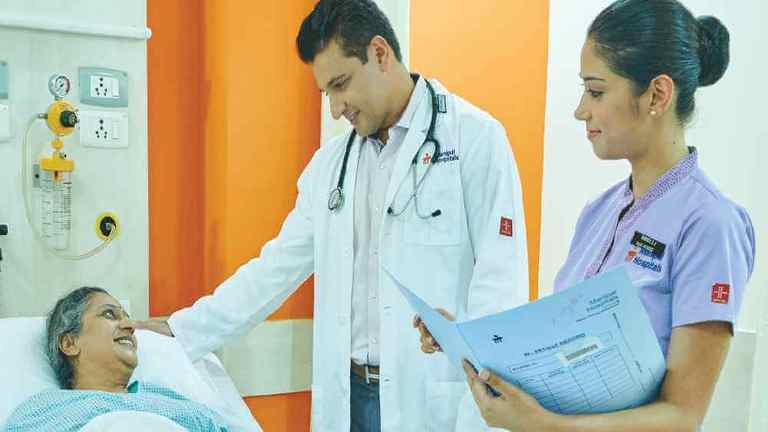-
Book Appointments & Health Checkup Packages
- Access Lab Reports
-
-
Book Appointments & Health Checkup Packages
-
Centre of
Excellence
Centre of Excellence
Other Specialities
- Accident and Emergency Care
- Dental Medicine
- Dermatology
- Diabetes and Endocrinology
- Ear Nose Throat
- ICU and Critical Care
- Internal Medicine
- Neonatology & NICU
- Neurology
- Nutrition And Dietetics
- Obstetrics and Gynaecology
- Ophthalmology
- Orthopaedics
- Paediatric And Child Care
- Physiotherapy
- Pulmonology (Respiratory and Sleep Medicine)
- Radiology
- Spine Care
- Doctors
- Salem
-

Bengaluru

-

Bhubaneswar
-

Delhi - NCR

-

Delhi - NCR
-
-

Goa
-

Jaipur
-

Kolkata

-

Mangaluru
-

Mysuru
-

Patiala
-

Pune

-

Salem
-

Vijayawada
- International Patients












Diabetes and Endocrinology
Best Diabetes Hospital in Salem
Manipal Hospitals Salem is renowned as one of the best diabetic care centres in Tamil Nadu. The hospital is committed to providing exceptional healthcare services and has established a strong reputation for its specialised expertise in offering end-to-end treatments and diagnostic services for diabetes. A team of skilled doctors, advanced technology, and a patient-centric approach make it the preferred choice for diabetology care in Salem.

OUR STORY
Know About Us
Why Manipal?
At Manipal Hospitals, the best diabetes hospital in Salem, Tamil Nadu. We offer numerous benefits for individuals seeking specialised care in diabetology. With a team of experienced and skilled diabetologists, the hospital provides comprehensive treatment and management options for diabetes wherein patients benefit from advanced diagnostic facilities, cutting-edge technology, and personalised treatment plans tailored to their needs. The hospital also emphasises patient education, empowering individuals with knowledge about diabetes self-management. Additionally, the department focuses on a multidisciplinary approach, collaborating with nutritionists, physiotherapists, and other specialists to ensure holistic care. Thus, choose world-class diabetology care and improved health outcomes.
Treatment & Procedures
Endocrine Therapy
This is a treatment done to add, block or remove hormones in the body. Depending on the nature of the hormonal disorder, an endocrinologist will recommend medication or treatment that increases or regulates the levels of a hormone or multiple hormones in the body. For example, diabetics are often given insulin to help control their blood sugar. It…

Diet Food
Eating healthy meals at regular intervals is the foundation of a diabetes diet. It is easier to utilise the insulin the body produces or obtains from medication when meals are consumed regularly. Our expert diabetologists at Manipal Hospitals Salem provide you with simple dietary guidelines to manage diabetes including eating the healthiest foods in reasonable portions and maintaining regular mealtimes. This nutritious diet is low in calories and fat and naturally abundant in nutrients. Fruits, vegetables, and whole grains are essential components of nutrition-rich food. All plant food components your body cannot digest or absorb constitute dietary fibre. Fibre helps manage blood sugar levels and moderates how your body digests food. Seafood is considered heart-healthy and doctors often suggest to eat seafood at least twice a week. Fish high in omega-3 fatty acids include salmon, mackerel, tuna, and sardines, and these omega-3s could guard against heart disease.
You can create a diet based on your health objectives, preferences, and lifestyle with the assistance of your doctor for diabetes treatment in Salem. The doctor can also suggest ways to change your eating habits as required.
Type 1 Diabetes
A chronic disorder, type 1 diabetes was once referred to as juvenile diabetes or insulin-dependent diabetes. Little to no insulin is produced by the pancreas in this situation. The hormone insulin is used by the body to let glucose (sugar) into cells, which can be used to make energy. Various elements, including genetics and some viruses, may cause type 1 diabetes. Despite typically developing in childhood or adolescence, type 1 diabetes can sometimes strike adults.
Type 1 diabetes is treated with:
-
Injecting insulin
-
Tracking protein, fats, and carbohydrates
-
Frequently checking blood sugar
-
Eating nutritious food
-
Regular exercise and maintaining a healthy weight.
For difficulties to be postponed or avoided, it is essential to maintain blood sugar levels as close to normal as feasible. Pre-meal blood sugar levels should typically be between 80 and 130 mg/dL (4.44 and 7.2 mmol/L) during the day. Two hours after eating, post-meal values shouldn't be more than 180 mg/dL (10 mmol/L). At Manipal Hospitals Salem, our diabetes doctors will help you assess your condition and offer the best course of treatment to keep your diabetes under control.
Type 2 Diabetes
Type 2 diabetes is a chronic illness that occurs when there is a dysfunction in the body's ability to control and utilise sugar (glucose) as fuel and too much glucose flow into the bloodstream. Type 2 diabetes has two issues. Insulin, a hormone that controls how quickly sugar enters cells, is insufficiently produced by the pancreas. Additionally, cells absorb less sugar and have a weak insulin response. Over time, cardiovascular, neurological, and immune system issues may result from excessive blood sugar levels.
Diabetes type 2 can be controlled with therapeutic medications and, in some circumstances, even reversed. Most treatment options call for blood glucose monitoring, your doctor will advise you on how frequently to do so as the objective is to remain within a specific range. Your doctor may also suggest lifestyle modifications and diet to manage your type 2 diabetes. Consuming foods high in fibre and good carbohydrates, such as fruits, vegetables, and whole grains, can help maintain stable blood sugar levels. Regularly spaced meals. Maintaining a healthy weight and heart requires learning to listen to your body, stop eating when you're full, and limit your intake of refined carbohydrates, sweets, and animal fats. Get roughly 30 minutes of physical activity daily to help keep your heart healthy - exercise can also help with blood glucose control.
Pregnancy Diabetes
Diabetes initially identified during pregnancy (gestation) is known as gestational diabetes. The way your cells use sugar (glucose), as with other types of diabetes, is impacted by gestational diabetes. High blood sugar levels brought on by gestational diabetes can harm both your and the unborn child's health.
Even though any pregnancy problem is alarming, there is good news. Gestational diabetes can be managed during pregnancy by eating well, exercising, and, if necessary, taking medication. Blood sugar management with a doctor’s advice can ensure the health of both you and your unborn child and avoid a challenging birth.
Conclusion
Diabetes control is improved by the hospital's skilled diabetologists, modern tests, and customised treatment strategies. People can take better care of themselves and improve their quality of life by prioritising patient education. Diverse specialists work together as part of Manipal Hospitals' collaborative approach to care, ensuring all-encompassing and holistic treatment. Patients benefit from the hospital's cutting-edge facilities, soothing comforts, and caring staff. For individuals looking for the best diabetology care, we provides a ray of hope and healing for individuals looking for the best diabetology care because of its unrelenting commitment to quality, with a dedication to high-quality healthcare and improved health results.

Facilities & Services
Modern diagnostic services, such as cutting-edge labs for thorough blood tests, such as A1C tests, Glucose Tolerance tests, and HbA1c assessments are available at the best diabetes hospital in Salem. The accurate diagnosis and monitoring of diabetes made possible by these facilities allows for quick treatment plan modifications and interventions. The hospital's diabetology division strongly emphasises patient education, providing enlightening seminars and materials to help people with the knowledge and abilities required for efficient self-management of their disease. This includes advice on managing medications, adopting good eating practices, and changing one's lifestyle. In addition, collaborations with dietitians, physiotherapists, and other experts guarantee thorough and all-encompassing care. We guarantee a streamlined and trouble-free experience for those seeking diabetology care and those seeking top-notch care since it provides specialised knowledge, cutting-edge diagnostic facilities, patient education programs, and multidisciplinary collaborations.
FAQ's
During your first visit, your medical history will be taken and examined, after which consultation with an endocrinologist will decide which tests you need to take. Certain test reports may take time to come back from the lab, so you may be asked to return at a later date.
Annual screenings are recommended for individuals above 45 or earlier with risk factors such as obesity or a family history of diabetes.
Obesity Family history Age PCOS High blood pressure
In some cases, lifestyle changes such as healthy eating and regular exercise can effectively manage diabetes, but medication or insulin may be necessary for others.
Fatigue Increased thirst Blurred vision Slow healing of sores and wounds. Frequent urination Frequent gum & skin infections
Frequent urination, excessive thirst, unexplained weight loss, increased hunger, fatigue, and blurry vision are common symptoms of diabetes.
Type 2 diabetes can be prevented or controlled by making good lifestyle choices in your diet and exercise.
Uncontrolled diabetes can lead to heart disease, stroke, kidney damage, nerve damage, eye problems, and foot complications.
Since the risk of diabetes increases with age and with a family history of diabetes, it is considered a good practice to visit an endocrinologist once every year to examine the need for medication or changing your lifestyle.
While some risk factors are non-modifiable, adopting a healthy lifestyle by maintaining a balanced diet, staying physically active, and maintaining a healthy weight can significantly reduce the risk of developing diabetes.
Manipal Hospitals understands that the treatment of endocrinological disorders requires a long term approach. This is why Manipal Hospitals is dedicated to its patients and their long term health and its team of experienced experts is a testament to this. Contact us to know more about how to keep your endocrine system healthy and book an appointment with one of our experts today!







